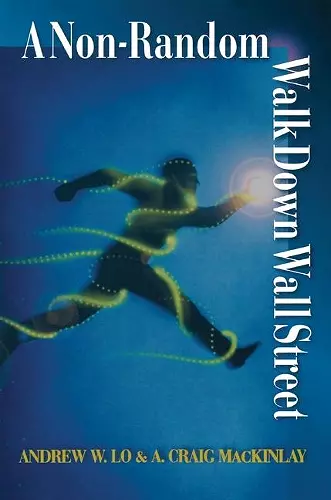A Non-Random Walk Down Wall Street
Andrew W Lo author A Craig MacKinlay author
Format:Paperback
Publisher:Princeton University Press
Published:26th Feb '02
Currently unavailable, and unfortunately no date known when it will be back

This provocative collection of essays provides careful empirical analyses of the major anomalies that have appeared in financial markets in the thirty-five years since Paul Cootner's influential Random Character of Stock Market Prices. It provides convincing evidence against the random walk as applied to stock markets, and at the same time warns us of the dangers of finding spurious anomalies. It is a worthy successor to Cootner's classic. -- Michael Brennan, University of California, Los Angeles This book is highly recommended to academic and private-sector economists who are interested in understanding better the behavior of financial market returns. -- Lars Peter Hansen, University of Chicago The common feature of this work ... is that it is guided by simple economic intuitions while simultaneously being econometrically rigorous and careful. -- Bruce N. Lehmann, UC-San Diego
Financial experts have regarded the movements of markets as a random walk - unpredictable meanderings akin to a drunkard's unsteady gait - and this hypothesis has become a cornerstone of modern financial economics and many investment strategies. This work puts the Random Walk Hypothesis to the test.For over half a century, financial experts have regarded the movements of markets as a random walk--unpredictable meanderings akin to a drunkard's unsteady gait--and this hypothesis has become a cornerstone of modern financial economics and many investment strategies. Here Andrew W. Lo and A. Craig MacKinlay put the Random Walk Hypothesis to the test. In this volume, which elegantly integrates their most important articles, Lo and MacKinlay find that markets are not completely random after all, and that predictable components do exist in recent stock and bond returns. Their book provides a state-of-the-art account of the techniques for detecting predictabilities and evaluating their statistical and economic significance, and offers a tantalizing glimpse into the financial technologies of the future. The articles track the exciting course of Lo and MacKinlay's research on the predictability of stock prices from their early work on rejecting random walks in short-horizon returns to their analysis of long-term memory in stock market prices. A particular highlight is their now-famous inquiry into the pitfalls of "data-snooping biases" that have arisen from the widespread use of the same historical databases for discovering anomalies and developing seemingly profitable investment strategies. This book invites scholars to reconsider the Random Walk Hypothesis, and, by carefully documenting the presence of predictable components in the stock market, also directs investment professionals toward superior long-term investment returns through disciplined active investment management.
"What Andrew W. Lo and A. Craig MacKinlay impressively do ... [is look] for hard statistical evidence of predictable patterns in stock prices... Here they marshal the most sophisticated techniques of financial theory to show that the market is not completely random after all."--Jim Holt, Wall Street Journal "With all its equations, this book is going to turn out to be a classic text in the theory of finance. But it is also one for practitioners."--Diane Coyle, The Independent (London) "Where are today's exploitable anomalies? Lo and MacKinlay argue that fast computers, chewing on newly available, tick-by-tick feeds of market-transaction data, can detect regularities in stock prices that would have been invisible as recently as five years ago. One example: 'clientele bias,' in which certain stocks are popular with investors who have certain trading styles. A case in point that doesn't take a supercomputer to detect, is day traders' current enthusiasm for Internet stocks. Lo says that day traders tend to overreact to news--whether that news is positive or negative--so it should be possible to profit by taking the opposite side of their trades."--Peter Coy, Business Week
ISBN: 9780691092560
Dimensions: unknown
Weight: 680g
448 pages